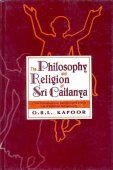Ramananda, Rāmānanda: 5 definitions
Introduction:
Ramananda means something in Hinduism, Sanskrit, the history of ancient India. If you want to know the exact meaning, history, etymology or English translation of this term then check out the descriptions on this page. Add your comment or reference to a book if you want to contribute to this summary article.
India history and geography
Source: Shodhganga: a concise history of Sanskrit Chanda literature (history)Rāmānanda (रामानन्द) and Jayalakṣmī are the parents of Amṛtānanda (19th century), who composed a text named Chandomṛtalatā. Amṛtānanda was a resident of Nepal and appointed as a Pundit.

The history of India traces the identification of countries, villages, towns and other regions of India, as well as mythology, zoology, royal dynasties, rulers, tribes, local festivities and traditions and regional languages. Ancient India enjoyed religious freedom and encourages the path of Dharma, a concept common to Buddhism, Hinduism, and Jainism.
Languages of India and abroad
Sanskrit dictionary
Source: Cologne Digital Sanskrit Dictionaries: Aufrecht Catalogus Catalogorum1) Rāmānanda (रामानन्द) as mentioned in Aufrecht’s Catalogus Catalogorum:—guru of Brahmānanda Bhāratī (Vākyasudhāṭīkā). Hall. p. 130.
2) Rāmānanda (रामानन्द):—son of Gopāla, father of Jānakīnandana Kavīndra (Vṛttadarpaṇa). L. 2038.
3) Rāmānanda (रामानन्द):—the founder of a religious sect. H.H. Wilson's Works 1, 46. Oxf. 302^a.
4) Rāmānanda (रामानन्द):—Nyāyāmṛtavyākhyā. Rice. 152. See Nyāyāmṛtataraṅgiṇī.
5) Rāmānanda (रामानन्द):—
—[commentary] on Bṛhadrudropapurāṇa.
—[commentary] on Bṛhadrudrayāmala.
6) Rāmānanda (रामानन्द):—Rāmārcanapaddhati.
7) Rāmānanda (रामानन्द):—Vaiṣṇavamatābjabhāskara.
8) Rāmānanda (रामानन्द):—Śivarāmastotra.
9) Rāmānanda (रामानन्द):—Śūdrakuladīpikā.
10) Rāmānanda (रामानन्द):—Harivaṃśaṭīkā.
11) Rāmānanda (रामानन्द):—son of Mukundapriya, grandson of Rāmendravana, pupil of Rāmendravana and Caturbhuja: Kāśīkhaṇḍaṭīkā, written by request of Vāsudeva. Gaṅgāsahasranāmaṭīkā, from the preceding
—[commentary]. Bālabodhinī.
12) Rāmānanda (रामानन्द):—father of Rāghavadeva (Kalpataru).
13) Rāmānanda (रामानन्द):—son of Mukundapriya, grandson of Gadādhara:
—[commentary] on Śaṅkarācārya’s Aparādhakṣamāstotra. Kāśīkhaṇḍaṭīkā.
14) Rāmānanda (रामानन्द):—C. on Śaṅkarācārya’s Aparādhasundarastotra.
15) Rāmānanda (रामानन्द):—son of Viṣṇvānanda: Abhijñānaratnāvalī [tantric]
Source: Cologne Digital Sanskrit Dictionaries: Monier-Williams Sanskrit-English Dictionary1) Rāmānanda (रामानन्द):—[from rāma] m. Name of a disciple of Rāmānuja (See below) and founder of a subdivision of his sect, [Horace H. Wilson]
2) [v.s. ...] (also with ācārya, yati, vācas-pati, sarasvatī etc.) of various authors and other men, [Catalogue(s)]
[Sanskrit to German]
Sanskrit, also spelled संस्कृतम् (saṃskṛtam), is an ancient language of India commonly seen as the grandmother of the Indo-European language family (even English!). Closely allied with Prakrit and Pali, Sanskrit is more exhaustive in both grammar and terms and has the most extensive collection of literature in the world, greatly surpassing its sister-languages Greek and Latin.
See also (Relevant definitions)
Starts with: Ramananda acarya, Ramananda devasharman, Ramananda sarasvati, Ramananda sarasvati yati, Ramananda vacaspati, Ramananda yati, Ramanandanatha, Ramanandaraya, Ramanandasharman tripathin, Ramanandasvamin, Ramanandatirtha.
Ends with: Bhavitaparamananda, Paramananda, Trivikramananda, Viramananda.
Full-text (+98): Ramanandiya, Ramendravana, Mukundagovinda, Mukundapriya, Yogamaniprabha, Ramanandaraya, Ramanandasvamin, Ramanandatirtha, Ramarcanapaddhati, Shivaramastotra, Tantramrita, Ramananda sarasvati, Vishnubhaktirahasya, Madhavaramanandasarasvati, Dattarcanavidhicandrika, Sri Ramananda Saraswati, Caitanyavana, Mugdhabodhatika, Shudrakuladipika, Samkhyapadarthagatha.
Relevant text
Search found 22 books and stories containing Ramananda, Rāmānanda; (plurals include: Ramanandas, Rāmānandas). You can also click to the full overview containing English textual excerpts. Below are direct links for the most relevant articles:
Greetings To ‘Triveni’ < [January-February 1931]
Babu Ramananda Chatterji < [September 1944]
Religious Movements In Medieval India < [January-February, 1930]
Jnaneshwari (Bhavartha Dipika) (by Ramchandra Keshav Bhagwat)
Prasthanatrayi Swaminarayan Bhashyam (Study) (by Sadhu Gyanananddas)
4.2. Arrival in Gujarat < [Chapter 1 - Introduction]
4.3. Unique Prayer < [Chapter 1 - Introduction]
Chaitanya Bhagavata (by Bhumipati Dāsa)
Verse 3.3.184 < [Chapter 3 - Mahāprabhu’s Deliverance of Sarvabhauma, Exhibition of His Six-armed Form, and Journey to Bengal]
Verse 3.5.202 < [Chapter 5 - The Pastimes of Nityānanda]
Verse 1.1.170 < [Chapter 1 - Summary of Lord Gaura’s Pastimes]
A History of Indian Philosophy Volume 4 (by Surendranath Dasgupta)
Part 5 - Some Companions of Caitanya < [Chapter XXXII - Caitanya and his Followers]
Part 4 - Gleanings from the Caitanya-caritāmṛta < [Chapter XXXII - Caitanya and his Followers]
Part 2 - The Life of Caitanya < [Chapter XXXII - Caitanya and his Followers]
Bhajana-Rahasya (by Srila Bhaktivinoda Thakura Mahasaya)
Related products

